- Home
- Darrell Maloney
Rest in Peace Page 6
Rest in Peace Read online
Page 6
“Good luck to you Sennett. We don’t want to see you around here any more, you hear?”
And he gave the standard released-con answer.
“Don’t worry. I’m never coming near this place again.”
Never say never.
Sennett did what many convicted felons did after his release and ran with his own kind: other ex-cons.
He was able to find work, which was good because many ex-cons have a hard time with that.
He had a couple minor skirmishes with the law, but never anything that caused them to slap the cuffs on him.
Just prior to Saris 7 hitting the earth, he was one of a group of men who took over the Shady Rest Home for Children on Highway 87 south of Eden.
He was one of the men who shot all the boys and men, assuming they’d be trouble at some point.
They let the girls live so they could abuse them and use them to do their cooking and cleaning.
But even they were cast out in the cold when the second freeze came, so they didn’t eat all the men’s food.
Not long before the men at the Shady Rest determined they didn’t have enough liquor to get them through a protracted freeze and one of them mentioned he’d seen an abandoned truck a few miles south, parked at a roadside truck stop.
“The whole front of the trailer’s full of booze,” the man claimed. The reason it’s never been looted is because the back of the trailer has several pallets of dog food. None of the looters never went past the dog food to see if there was anything different up front.”
It was the early days of the second freeze.
The roads were still passable, but just barely.
The men at the Shady Rest knew if they were going to beef up their liquor stores they were running out of time to do it.
Sennett had grown up in the upper peninsula of Michigan. He wasn’t intimidated by a little snow.
Or a lot of it.
“I’ll drive,” he told the man who’d seen the booze. “You just show me how to get there.”
Sennett and the other man, named Romo, braved a driving snowstorm that night and filled up the back of a pickup with cases of whiskey, tequila and gin.
Driving back to the orphanage they found the additional weight in the back gave them better traction on the icy roads, and they were in jubilant spirits as they approached the Shady Rest.
The open bottle of tequila they passed back and forth as they drove didn’t dampen their spirits any either.
What did dampen their spirits, though, was to get back to the orphanage to find a still smoking pile of burned wreckage, and all their friends blown to bits.
The two of them were in a tight.
The orphanage was a great set-up.
From the first days of the thaw the women worked to grow crops to replenish the food supplies they’d used while the world was frozen over.
They grew far more than what they needed and canned or dried the excess, vowing to be more prepared should a second freeze come.
The men scoffed at the silly orphans, pointing out to them that the first freeze was a one-in-a-million occurrence and there was no way it would happen again in any of their lifetimes.
Then it did.
The men had no idea how long this one would last.
All they had to go on was the length of the first one: about seven and a half years.
If the second freeze lasted as long, they’d run out of food.
So they banished the women. Drove them out into the storm to fend for themselves.
Then they settled in for the long term.
Alas, though, something happened in Sennett’s and Romo’s absence.
The orphanage was no longer an option.
“What the hell do we do now?” Romo asked.
Romo was a follower, and needed a leader to guide him.
“I know three guys in San Angelo. We can make it that far.”
And they did. But Sennett’s friends in San Angelo were in no better position to ride out a long freeze than Sennett and Romo.
“I know of only one other option,” Sennett suggested to his new gang.
“It won’t be easy. But we can do it if we work together and have a plan.”
-17-
Sennett told his new gang, “The only other place in the area with enough provisions to last until the thaw is the old Eden prison.”
Suarez, the mouthiest among them, said, “You’re crazy, man. Why would an old prison be stocked with provisions?”
“Because somehow the people in Eden knew the second freeze was coming.
“They spent the last few months stocking it. Now they’ve all disappeared. It doesn’t take a genius to figure out where they went.”
He took a pencil to paper and sketched out the prison grounds, the way he remembered them.
“Do you think anything’s changed?” Kelly asked. “After all, it’s been fifteen years since you got released.”
“Yeah,” Sennett said. “But you gotta remember it was evacuated just before Saris 7 hit the earth. So it’s been empty for ten of those years.
“And a prison isn’t like the broken down trailer your mama lives in.”
“My mama’s dead. And she never lived in a trailer anyway.”
“That ain’t my point, dumbass. My point is that a prison isn’t built with portable buildings or buildings that can be easily moved. They’re built with buildings made of fortified concrete. Buildings that are meant to last for a very long time.
“Those types of buildings are hard to modify. Prisons pretty much stay the same for generations.
“You’ll have to trust me on this. It’s pretty much the same I remember it.”
“I don’t know about breaking into a prison, man. That sounds kind of backward to me.”
“Suit yourself. We’ll just leave you out here in the snow to fend for yourself and see how that works out for you.”
“Oh, I didn’t say I wasn’t going. I just said it sounds kinda weird is all.”
“When are we going?”
“We’re gonna hole up in a house a couple of blocks away from the prison. I’ve already scouted it out. It’s got everything we need. There’s a painter’s van parked across the street with two ladders on a roof rack.
“Heavy blankets we can use to cover the razor wire as we climb over it.
“It’s even got a fireplace and plenty of wood furniture we can break up and burn to keep us warm while we’re waiting.”
“Waiting for what, exactly?”
“Waiting for a bad snowstorm. Bad enough to allow us to sneak up to the prison without being seen.”
The first night in the big house not far from the prison there was no snow at all and a full moon.
The five men spent their night in front of a roaring fire playing poker to kill time.
“This is a nice place,” Martin observed. “I wonder who lived here.”
“Who cares?” Sennett shot back. “Some rich dude.”
As he said the words he snatched a framed photo from the mantle above the fireplace.
A photo of Mayor Al, his wife and daughter.
He didn’t know Mayor Al from Adam. And even if he had he’d have thought nothing of it as he tossed the photograph into the fire to add to the fuel.
The glass shattered when it hit the fire and the flames made quick work of his honor’s smiling face.
The second night there were snow flurries and the men hoped they could set their plan in motion. But a mostly full moon hampered the plan and provided a bit of light even through the heavy brown haze. The heavy snow they were hoping for never materialized.
They finally got their green light on the third evening.
Through the haze of the now permanently brown sky they could just barely make out the sun overhead.
Not because they could see it, but because it turned the haze into a slightly lighter shade of brown.
But in its last hour the lighter shade which marked the sun disappeared completely as heav
y cloud cover moved into the area.
The snow soon followed.
And by the time Lenny Geibel neared the end of his shift that third night there was a raging snowstorm going on, accompanied by near white-out conditions.
-18-
Their plan went off more or less flawlessly.
All five had something to carry.
But none of it was particularly heavy, and they only had to lug it for two city blocks.
The darkness, coupled with the blinding snow, hid their movements quite well.
So well that when they stopped a couple of times along the way to catch their breath they were able to stop in the middle of the street and didn’t have to worry about being seen.
Of course it helped knowing the small town was deserted; there wouldn’t be anyone there to see them anyway.
Kelly and Martin carried the ladders. They were the biggest of the five. They’d been bodybuilders before Saris 7 came along and had struggled during and after the first freeze to stay more or less in shape.
So the aluminum ladders were no problem for them.
The other three carried mover’s blankets they’d found in Mayor Al’s garage.
The blankets weren’t really blankets at all, not technically. They weren’t made to keep anyone warm and cozy. Rather they were used by moving companies to wrap around furniture to prevent it from being damaged.
They were stiff but lightweight, thick and tough.
These particular blankets were wrapped around the new piano Al had delivered the week before Saris 7 became a ‘thing,” and were inadvertently left behind by the movers.
They’d been gathering dust in Al’s garage ever since, and would do a bang-up job of covering the concertina wire when Sennett and his crew scaled the prison’s fences.
They stopped fifty feet away from the prison and hid behind a truck parked on the shoulder of Highway 87, which ran directly in front of the place.
By now they’d done enough surveillance to know the people inside only dispatched a single sentry to patrol outside the wire.
Once they took out the sentry there would be no one to challenge them as they proceeded.
“Stay here,” Sennett said to the others.
He could have sent one of the others. He was the leader, after all. The others did what he told them to do.
But at the same time, Sennett knew that leadership not only had to be earned, but also had to be reinforced occasionally.
The men had to be reminded sometimes why Sennett was the leader.
And that he didn’t mind doing himself anything he told them to do. He didn’t mind getting his hands dirty.
And if the things he did occasionally struck fear in their hearts by their brutality that was okay too.
In Sennett’s view it was a good thing for men to fear their leader.
It helped keep them in line; it helped prevent them from getting antsy and starting to entertain any thoughts of a coup.
Sennett used the driving snow as cover to sneak up behind Lenny.
He used the howling wind to help cover the sound of the gunshot.
The wind was moving at twenty knots and the gatekeeper’s shack was upwind.
The gatekeeper checked his watch at the exact time Sennett fired his shot and never looked up.
He was anxious to end his shift, just as Lenny was.
And he simply had no reason to take his attention away from the watch.
Because he never heard the shot.
As Lenny’s blood poured out of his wound and melted the snow beneath him Sennett made his way back to the parked truck.
“Let’s go,” he said to his men.
They made their way to the first of the double fences.
It was chain link and ten feet in height.
The top was covered with a heavy coil of concertina wire, its razor-sharp barbs lying in wait and just itching to tear their skin.
But the one-inch thick mover’s blanket placed over the top of the wire would allow them safe passage.
Sennett took the ladder from Kelly, in case Kelly wasn’t smart enough to know how to place it.
He put the ladder against a fence post, the post centered on the top rung.
By doing so he prevented the possibility of the flimsy chain link fence collapsing beneath their weight.
Ladder in place, he tossed two of the three folded blankets he was carrying over the fence. He went up the ladder with the third one and placed it over the concertina wire.
Then he scurried over the wire and dropped to the concrete below.
While Kelly, Romo and Suarez followed him one at a time on the ladder, he motioned for Martin to push the second ladder over the fence.
Sennett was able to catch the end to minimize the clanging noise it made as it hit the ground.
Then Martin took his place in line, and within forty five seconds all five were inside the first fence.
But they were only halfway done.
All modern prisons have a double fence. Both are typically topped with concertina wire and the inner fence is typically electrified.
It was the electrified fence which worried Sennett the most.
And the one big secret he held from his men.
He strongly suspected it was no longer operational.
He’d heard the stories from men who were still locked up when the first freeze happened.
Wardens all over the country were faced with a difficult decision to make. On the one hand they could release the convicts knowing they’d terrorize the local community and cause great mayhem.
That would be the humanitarian thing to do.
The other option was to keep the inmates locked up, knowing they’d eventually run out of food and starve to death.
-19-
The warden at Eden was too soft-hearted. He released the inmates and was repaid for his kindness by death. One of the inmates stabbed him in the heart with a shank as he passed through the open door.
The most ironic thing was that the warden had extended his hand to the man and had wished him luck.
They were the warden’s last words.
Sennett heard from some of the prisoners that they’d gone back to the prison because there was simply nowhere else to go. The kitchen still had a pretty good store of food, the commissary a pretty good stock of snacks.
Several of the freed cons figured their odds of surviving there were better than being out in the open.
Sennett heard the few who went back had to resort to eating snow when the facility’s well stopped pumping and they burned everything made of wood in a perpetually-burning campfire.
He also heard of the rage they felt at the place.
One of the men who was there later told Sennett they’d vented their anger at the place which once imprisoned them against their will. They took sledge hammers and smashed the breaker boxes, the electrical panels… and most importantly the large transformer which sent power to the electric fence.
Of course it was possible they’d replaced the demolished transformer when they were renovating the place from a prison to a shelter.
Just in case, Sennett had no intention of placing the second ladder against the chain link fence himself.
He’d have Martin do it.
Martin was expendable, you see.
Martin wasn’t the brightest star in the sky or the sharpest tool in the shed.
When Sennett stood back from the fence and pointed to Martin where to place the ladder Martin had no idea he was a guinea pig.
Sennett knew one of two things was going to happen.
Either the aluminum ladder would light up like a Christmas tree, sparking wildly when it touched the fence and cooking Martin like a marshmallow.
Or nothing would happen and Martin would scramble up the ladder.
If the fence was electrified Sennett would go to his Plan B.
He’d throw a folded up mover’s blanket against the foot of the ladder to knock it away from the fence.
&
nbsp; They’d use the ladder to climb back over the outer fence.
And instead of going over the walls they’d steal Lenny Geibel’s camouflage pants and parka.
Whoever was the best fit would put them on, then approach the gatekeeper’s shack hunched over, hiding his face from the bitter cold.
When the gatekeeper opened the locked door to let him in they’d pull out a weapon and shoot the gatekeeper dead, then force their way into the prison through the Sally port.
Doing so wasn’t without risk, since they couldn’t see whether there were any other sentries between the Sally port and the main entrance.
There could well be a gun battle, which was why that was their Plan B.
As it happened, the Plan B wasn’t needed.
Martin placed the ladder without incident and scurried to the top of it.
Romo threw him a mover’s blanket, which he used to cover the wire, and he was on the ground not long after.
Sennett and the other three were right behind him.
From the time Sennett fired the fatal shot into Lenny’s body until they made it to the prison yard was less than seven minutes.
Sennett felt a flush of pride, thinking a crack team of Navy Seals couldn’t have done any better.
Of course the Navy Seals wouldn’t have shot an innocent man. But that fact escaped Sennett’s mind as insignificant.
Once inside the yard the rest was easy.
Sennett was surprised, for the huge recreational yard was once nothing but a grassy field and a walking track with basketball courts and weight benches on either side.
Now almost every inch of the yard, including the courts, was covered with long-haul trailers. They were crammed in so tightly the group had to walk between them single file.
There simply was no room for any two of them to walk abreast.
Sennett led the way, simply because he knew where he was going and the others didn’t.
And truth be known, he’d have led the way anyway because he wanted to continually stress to the men he was their undisputed leader.
The point man in any military operation is always the most likely to die.
Sennett knew that.
And even though this wasn’t a military operation, it closely resembled one.

 A Perilous Journey
A Perilous Journey The Yellowstone Event: Book 6: The Aftermath
The Yellowstone Event: Book 6: The Aftermath Eden Bound
Eden Bound Without Warning
Without Warning Everything Has Changed
Everything Has Changed Rest in Peace
Rest in Peace This Changes Everything
This Changes Everything The Final Chapter
The Final Chapter It Can't Be Her
It Can't Be Her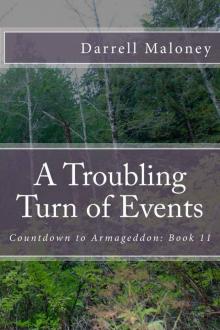 A Troubling Turn of Events
A Troubling Turn of Events The Blockade
The Blockade A Tearful Reunion
A Tearful Reunion Countdown to Armageddon
Countdown to Armageddon Alone, Book 3: The Journey
Alone, Book 3: The Journey The Army Comes Calling
The Army Comes Calling The Grim Reaper Comes Calling
The Grim Reaper Comes Calling Her Name is Beth: Alone: Book 5
Her Name is Beth: Alone: Book 5 Red: The Adventure Begins
Red: The Adventure Begins Rise From The Ashes: The Rebirth of San Antonio (Countdown to Armageddon Book 3)
Rise From The Ashes: The Rebirth of San Antonio (Countdown to Armageddon Book 3) An Unkind Winter (Alone Book 2)
An Unkind Winter (Alone Book 2) A Stunning Betrayal: Alone: Book 9
A Stunning Betrayal: Alone: Book 9 A Whole New World: Ranger: Book 2
A Whole New World: Ranger: Book 2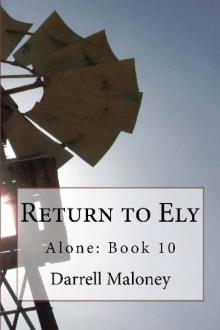 Return To Ely
Return To Ely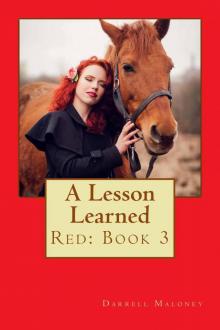 A Lesson Learned: Red: Book 3
A Lesson Learned: Red: Book 3 The Homecoming: Countdown to Armageddon: Book 5
The Homecoming: Countdown to Armageddon: Book 5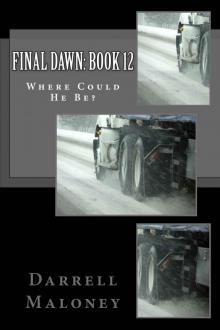 Final Dawn: Book 12: Where Could He Be?
Final Dawn: Book 12: Where Could He Be? An Acquired Taste
An Acquired Taste On Desert Sands: Alone: Book 6
On Desert Sands: Alone: Book 6 The Battle: Alone: Book 4
The Battle: Alone: Book 4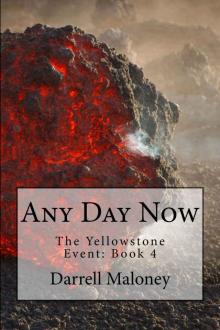 Any Day Now
Any Day Now Too Tough To Tame: Red: Book 2
Too Tough To Tame: Red: Book 2 No Help From Austin: Red: Book 5
No Help From Austin: Red: Book 5 An Unwelcome Homecoming
An Unwelcome Homecoming A New Start: Final Dawn: Book 9 (Volume 9)
A New Start: Final Dawn: Book 9 (Volume 9) A Stunning Betrayal
A Stunning Betrayal An Undeclared War (Countdown to Armageddon Book 4)
An Undeclared War (Countdown to Armageddon Book 4) One of Our Own: Final Dawn: Book 11
One of Our Own: Final Dawn: Book 11 Texas Bound: Alone: Book 11
Texas Bound: Alone: Book 11 Payback: Alone: Book 7
Payback: Alone: Book 7 The Quest: Countdown to Armageddon: Book 6
The Quest: Countdown to Armageddon: Book 6 The Siege
The Siege The Yellowstone Event: Book 1: Fire in the Sky
The Yellowstone Event: Book 1: Fire in the Sky Return to Blanco (Red Book 4)
Return to Blanco (Red Book 4) The Search
The Search AFTER THE DUST SETTLED (Countdown to Armageddon Book 2)
AFTER THE DUST SETTLED (Countdown to Armageddon Book 2) Death Comes Calling (Ranger Book 3)
Death Comes Calling (Ranger Book 3) A Long Road Back: Final Dawn: Book 8
A Long Road Back: Final Dawn: Book 8